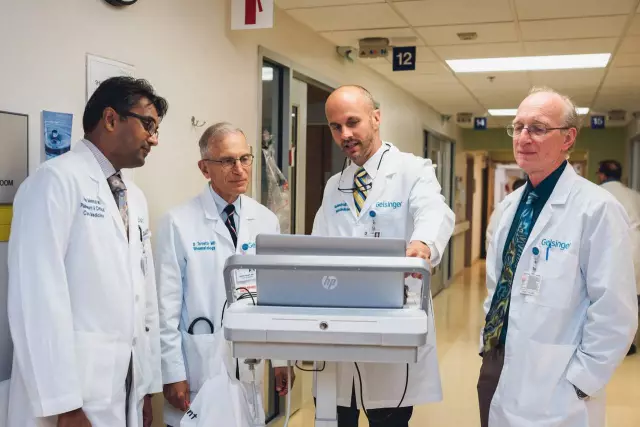- Author Rachel Wainwright wainwright@abchealthonline.com.
- Public 2023-12-15 07:39.
- Last modified 2025-11-02 20:14.
7 misdiagnoses that patients make to themselves
Many Russians prefer not to go to a doctor if they feel unwell, solving the problems that arise on their own. However, their actions, as a rule, have nothing to do with the Concept of Responsible Self-Treatment, officially adopted by the World Health Organization. Such people, in particular, not only do not have a clear idea of when it is possible to do without the help of professional doctors, but also do not understand what danger they are exposing themselves to. But they always "know well" what ailment provokes the appearance of each unpleasant symptom. Simply put, they are engaged in self-diagnosis without the necessary knowledge and technical capabilities.
Today we will talk about what the diagnoses that people make to themselves really mean, and how they relate to real-life diseases.

Source: depositphotos.com
Migraine
This is what many call any headache. However, a real migraine has certain features that are not seen with other types of pain:
- localization of pain in one half of the head. The sides can change from seizure to seizure;
- the presence of harbingers of an attack, which include general weakness, obsessive yawning, inability to concentrate. Sometimes there are visual effects (such as spots of light or glitter in front of the eyes). Perception of certain smells or sounds may increase before an attack;
- relapses with a frequency of from 1 time per six months to 6-7 times a month. Each attack lasts an average of 6-8 hours;
- migraine pain is strong, pressing, throbbing;
- the attack is accompanied by phobia or sound, nausea, and sometimes vomiting.
A migraine attack can be triggered by weather extremes or physical stress. Migraine is a chronic neurological disease, the main cause of which is heredity.
The condition that most people think of as a migraine is actually a so-called tension headache. It occurs with emotional stress or with prolonged incorrect position of the neck and head (for example, when working in an uncomfortable position). The pain is bilateral, not as intense and intrusive as with a migraine. The human condition can be easily alleviated with the help of a short rest, walking in the fresh air, light massage of the temples and the back of the head. In a severe case, you can use an anesthetic medication and the pain will quickly subside. With a migraine attack, all of these methods are ineffective.

Source: depositphotos.com
Depression
In everyday life, this is often the name for manifestations of depression, bad mood and sadness caused by overwork or life's adversities. In fact, depression is a mental disorder that only a specialist can diagnose. Long-term observation of the following behavioral features in a previously calm and cheerful person should be a cause for alarm and a visit to a doctor:
- anxiety;
- decreased self-esteem;
- indecision, problems with making independent decisions;
- resentment;
- confidence in their own uselessness;
- reclusiveness;
- trouble concentrating;
- loss of interest in life.
In addition, people with depression experience constant physical distress. They often experience constipation, sleep disturbances, increased susceptibility to seasonal infections, and appetite either disappears or becomes excessive. Patients complain of constant fatigue, problems appear in the sexual sphere. In an effort to get rid of longing and fear at least temporarily, such patients may turn to alcohol or drugs.
The process of getting out of depression is very difficult. As a rule, patients are unable to cope with the problem on their own and need medical help. Lack of treatment can lead to the development of severe social phobias and even attempts at suicide.

Source: depositphotos.com
Vegetative-vascular dystonia
Not so long ago, a similar diagnosis was made to almost every patient who consulted a therapist with complaints of headaches, surges in blood pressure, heart palpitations, nervousness, rapid fatigue and similar ailments.
According to modern concepts, the disease called "vegetative-vascular dystonia" simply does not exist. This is just a generalized name for a complex of symptoms that appear with disorders of the nervous and cardiovascular systems. Each case of this kind requires an individual approach and careful examination in order to find out an accurate diagnosis.

Source: depositphotos.com
Osteochondrosis
In modern medicine, osteochondrosis is the process of destruction of intervertebral discs, which is accompanied by their separation, decrease in height and deformation. This is a serious pathology that can lead to disability. It requires serious and long-term treatment, and in advanced cases, surgical intervention.
It is wrong to consider any back pain as osteochondrosis. If the doctor makes this diagnosis without conducting a detailed examination, it is worth contacting another specialist.

Source: depositphotos.com
Rheumatism
It is such a disease that people who suffer from lower back pain define in themselves. Their problems have nothing to do with rheumatism.
Rheumatism is a serious illness of an infectious and allergic nature. It manifests itself as a deterioration in the functioning of the cardiovascular system and severe joint pain caused by inflammation. The presence of an ailment is determined based on the results of a number of tests and diagnostic procedures. Rheumatism is treated by cardiologists, orthopedists and rheumatologists.

Source: depositphotos.com
Sclerosis
Complaining of sclerosis, they usually mean the increasing cases of forgetfulness and absent-mindedness, which are associated with the onset of old age. In fact, such a disease does not exist.
Doctors talk about sclerotic changes in cases when individual tissues of organs are replaced by a thickened connective tissue. For example, there are atherosclerosis (damage to the walls of blood vessels), nephrosclerosis (changes in kidney tissue), cardiosclerosis (pathology of the heart muscle), osteosclerosis (bone disease). Sclerotic changes can be caused by circulatory disorders, metabolic disorders, or inflammatory processes that occur in people of any age.

Source: depositphotos.com
Avitaminosis
It is customary to explain vitamin deficiency a decrease in performance, fatigue, depressed mood and other ailments that are traditional for the winter and early spring seasons. This is a massive misconception that is actively used by the manufacturers of vitamins and nutritional supplements.
In fact, vitamin deficiencies are severe, life-threatening metabolic disorders caused by a prolonged lack of vitamins in the diet. In past centuries, they suffered from people who had to eat monotonous foods for years or lead a half-starved existence. From diseases such as scurvy or pellagra, sailors, gold prospectors and prisoners died.
Modern man is spared from ailments of this kind. In order not to have problems with saturating the body with vitamins, you do not need to spend money on exotic fruits or on expensive pharmaceutical preparations. The necessary vitamins are enough in quite familiar and budgetary products.

Source: depositphotos.com
If a person calls a bad mood depression, and forgetfulness - sclerosis, this is not scary. It is much worse when he begins to be treated for "rheumatism" or "migraine" without visiting a doctor. The lack of competent help in such a situation can lead to the fact that a real-life disease will be neglected, and besides, taking self-selected drugs is likely to lead to additional health problems.
YouTube video related to the article:

Maria Kulkes Medical journalist About the author
Education: First Moscow State Medical University named after I. M. Sechenov, specialty "General Medicine".
Found a mistake in the text? Select it and press Ctrl + Enter.






